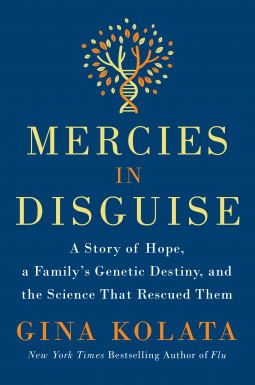 The question threading its way through the narrative nonfiction book, Mercies in Disguise, by Gina Kolata is one I’ve pondered before. If a hereditary degenerative disease showed up often in your family and you could be tested to see if you carried the gene, would you have the test?
The question threading its way through the narrative nonfiction book, Mercies in Disguise, by Gina Kolata is one I’ve pondered before. If a hereditary degenerative disease showed up often in your family and you could be tested to see if you carried the gene, would you have the test?
This story of the Baxter family exemplifies the odds of a fifty/fifty chance of having a gene for a disease that steals both body and mind slowly and ends in death. The frame is Amanda’s choice. It begins as she waits to hear the results of her test before going on to the backstory, and ends with the phone call and her response to it.
Irony lies in the fact that the Baxter family is filled with doctors. By chance, they begin to notice a similarity in family deaths that are attributed to Parkinson’s and other degenerative diseases. Once they realize the commonality of the rare disease, they are able to establish that it has been passed from one generation to the next, often receiving various labels since doctors themselves are not aware of the disease. In their bafflement, they label the sickness with the closest equivalent in their knowledge base.
Rogue scientists fill in a parallel story along with that of the family. They have the correct label, discover the gene marker, and find a test for it. As expected, family members differ in whether to test or not to test, sometimes finding a conflict between the possibilities of science and reliance on their faith.
This true story reads like a mystery novel with page-turning urgency. I found myself sympathizing with those who wanted to know and take every opportunity afforded by science and with those who wanted to live life with a faith that assumed they were in the fifty percent clear of the gene. Following Amanda feels like following the protagonist of an intriguing novel with the added urgency of knowing her story is true.
As for the question of whether I would want to know, I’m still pondering.